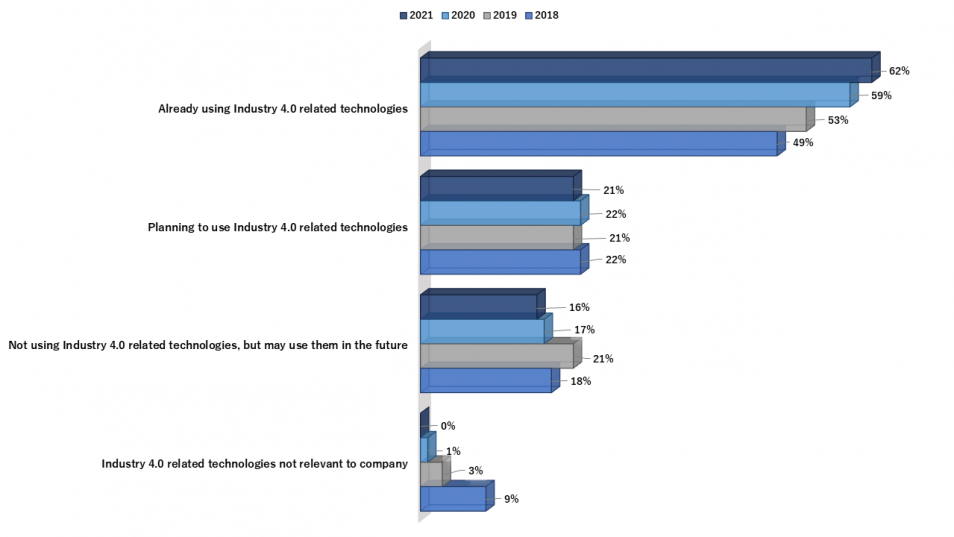No more disinterest in Industry 4.0 – Covid-19 pandemic Accelerates Digitalization of German Industry
 © DWIH Tokyo/iStock.com/gorodenkoff
© DWIH Tokyo/iStock.com/gorodenkoff
July 09, 2021
[by Toru Kumagai]
The results of a survey published on April 7, 2021 by the German Association for Information Technology (Bitkom) have attracted a great deal of attention in European academic and business circles. This is because the results of the survey clearly showed that the Covid-19 pandemic, which has been ravaging the world since the spring of 2020, has accelerated the digitization of German industry.
Covid-19 has led to a sharp increase in interest in digitization
Bitkom Research, a research institute, conducts every year a survey of German manufacturing companies on the digitalization of manufacturing industries, including Industry 4.0. Industry 4.0 is a digitalization plan for the manufacturing industry proposed by the German Federal Ministry of Education and Research (BMBF), the German Academy of Engineering (acatech), and other organizations in 2011, and is currently being promoted by the public and private sectors.
In February and March of 2021, directors, manufacturing managers, and other executives at 551 manufacturing companies with more than 100 employees were interviewed in the Bitkom survey. The results revealed that since the outbreak of the Covid-19 pandemic, interest in digitization has become significantly stronger among manufacturers.
For example, the number of companies that said they were already using Industry 4.0 related technologies increased by 13 percentage points to 62% this year, compared (2018: 49%). A total of 83% of respondents said they were either “already using” or “planning to use” Industry 4.0 related technologies. Three years ago, this percentage was only 71%.
Conversely, the percentage of companies that said “Industry 4.0 is not relevant to my company” was 9% in 2018 but zero in this year’s survey. In other words, since the unprecedented events of the Covid-19 pandemic, including production stoppages and supply chain disruptions, the number of companies that are not interested in digitalization has disappeared, at least among the companies participating in the survey.
Results of a survey on technologies related to Industrie 4.0
Source: Bitkom Research Industrie 4.0 (bitkom.org)

Strong interest in IoT platforms and 3D printers
In response to a Bitkom Research survey, 95% of respondents said that the importance of digitization has increased due to the Covid-19 pandemic. Only 3% of companies said that the importance had neither increased nor decreased.
What specific technologies are the companies participating in this survey interested in? 72% of the responding companies said they are using or planning to use digital platforms related to the Internet of Things (IoT), only 19% of the companies answered that they are not thinking of using IoT platforms.
An IoT platform is a system in which products, machine tools, and manufacturing equipment are connected via the Internet to centrally collect and manage data on manufacturing processes and product usage. These data will be automatically analyzed by artificial intelligence and used to provide new products and services to customers.
86% of the responding companies said they were already using 3D printers or planning to use them.
Interest in the 5th generation mobile communication system (5G) is also growing: in a survey published by Bitkom Research in May 2020, 72% of companies said that “5G is important to our company”. By 2021, the percentage had increased by 13 percentage points to 85%. Conversely, the percentage of companies that said “5G is not important” was halved from 26% in 2020 to 13% this year.
In fact, 5G is essential to the various technological innovations that Germany and other countries’ scientific and industrial communities are promoting in the 21st century. The data transmission speed of communication systems using 5G is much faster than the 4G systems in use today. For example, in 4G, there is a delay of 60 to 98 milliseconds (a millisecond is 1/1000th of a second) in data transmission, but in 5G, this delay will be shorter than 1 millisecond. The download speed of data for 4G is about 1 gigabyte per second, with 5G it will become 10 gigabytes per second. In other words, the immediacy of the transmission of images and sounds will increase, bringing us closer to what is called “real-time information transmission”.
If technologies such as Germany’s Industry 4.0, self-driving cars, and “connected cars” that exchange large amounts of data with surrounding cars while driving are to be put to practical use, the data transmission speed of 4G will not be sufficient, and the use of 5G will be a prerequisite.
Digital technology can help curb infection risk
63% of respondents to the Bitcome Research survey said that the Covid-19 pandemic was accelerating technological innovation in their companies, and 61% believe that it will drive the digitization of their companies in the long term. It is also interesting to note that 63% of the respondents said that digital technology is helping them overcome the negative effects of the Covid-19 pandemic. These figures reflect the increased importance of remote and non-contact technologies in terms of reducing the risk of infection by the new coronavirus.
Let me give you one example. In a German supermarket, there is an electronic scale at the cash register where the clerk weighs and charges for fruits and vegetables. Before Covid-19, Bizerba, a manufacturer of scales in Germany, developed an application to remotely maintain and repair these electronic scales from its headquarters. Prior to Covid-19, only 5% of the company’s customers used this remote service. However, after the Covid-19 pandemic broke out in the spring of 2020, the percentage of customers using the remote maintenance and repair service quadrupled to 20%. Many supermarket managers realized the benefits of this service in reducing the risk of infection.
Another example is the increase in telemedicine using remote technology. According to the Techniker Krankenkasse (TK), a public health insurance company, only 23 TK enrollees used telemedicine with their home doctor or other health care providers between October and December 2019, before the Covid-19 pandemic hit. But from April to June 2020, when the new coronavirus was raging, the number of people who used telemedicine rose to 19,701. That’s an 857-fold increase.
Progress that normally takes 10 years achieved in one year
The figures presented here show that the Covid-19 pandemic has become the catalyst for a kind of technological revolution. In the U.S. and Europe, we often hear the phrase, “A pandemic makes possible in one year progress that would normally take ten years”.
For example, until the end of 2019, no one imagined that they could conduct all their meetings, including corporate meetings and customer meetings, from home using remote conferencing technologies such as ZOOM. Now, even in Japan, no one thinks that such a way of communication is strange.
In the science fiction TV drama “Star Trek”, which began in 1966, there is a machine called a transporter that can transport a person to a remote location in an instant. Remote conferencing is a technology comparable to this transporter. You can have a meeting with someone living on the other side of the world – for free up to a certain amount of time.
Humankind is the middle of an unprecedented change. To translate this unprecedented change into social development and economic growth while taking into account ethical considerations, the exchange of information and cooperation between scientists, government officials, and business people from Japan and Germany is becoming ever more important. And this is the task to which the German Forum for Science and Innovation Tokyo (DWIH Tokyo) is dedicating its efforts!
Related article and event
You may also be interested in our recent article on the psychosocial impact of the Covid-19, “The fight of the German government and medical community against the psychological effects of the Corona pandemic”.
On June 10, the DWIH Tokyo and the Japanese-German Center Berlin (JDZB) organised a virtual symposium titled “Coping with the Crisis – The Psychosocial Impact of the Pandemic”, in which experts from Germany and Japan reported on their experiences during the Covid-19 pandemic. Additionally, researchers from various fields exchanged their findings and assessments of the impact of the pandemic in both countries. A recording of some of the presentations held during the panel discussion can be found in the event report.
Click here to read other articles from the series “Toru Kumagai’s report on R&D trends in Germany”.

About Toru Kumagai
Born in Tokyo in 1959, Kumagai graduated from the Department of Political Science and Economics at Waseda University in 1982 and joined Japan Broadcasting Corporation (NHK), where he gained a wealth of experience in domestic reporting and overseas assignments. After NHK, he has lived and worked as a journalist in Munich, Germany, since 1990. He has published more than 20 books on Germany and Germany-Japan relations, as well as been to numerous media outlets to report on the situation in Germany.
